The semifinals of the 2023 FIDE World Cup begin Saturday, August 19 at 6:00 a.m. CDT in Baku, Azerbaijan. At the same time, the finals and third-place match for the 2023 FIDE Women’s World Cup will begin. Now, let’s meet our (semi)-finalists and how they got here.
World Cup: Carlsen and Caruana on Collision Course (Or are they?)
Two of the top four seeds have advanced to the semifinals, with top-seeded GM Magnus Carlsen and third-seeded GM Fabiano Caruana taking care of business in a tournament notorious for producing upsets (just ask second-seeded GM Hikaru Nakamura).
Joining them are two surprising names: Azerbaijan’s GM Nijat Abasov and India’s GM Praggnanandhaa Rameshbabu. The 28-year-old Abasov has been rated as high as 2670, and surely was not many fans’ pick to be the last Azerbaijani player standing in Baku.
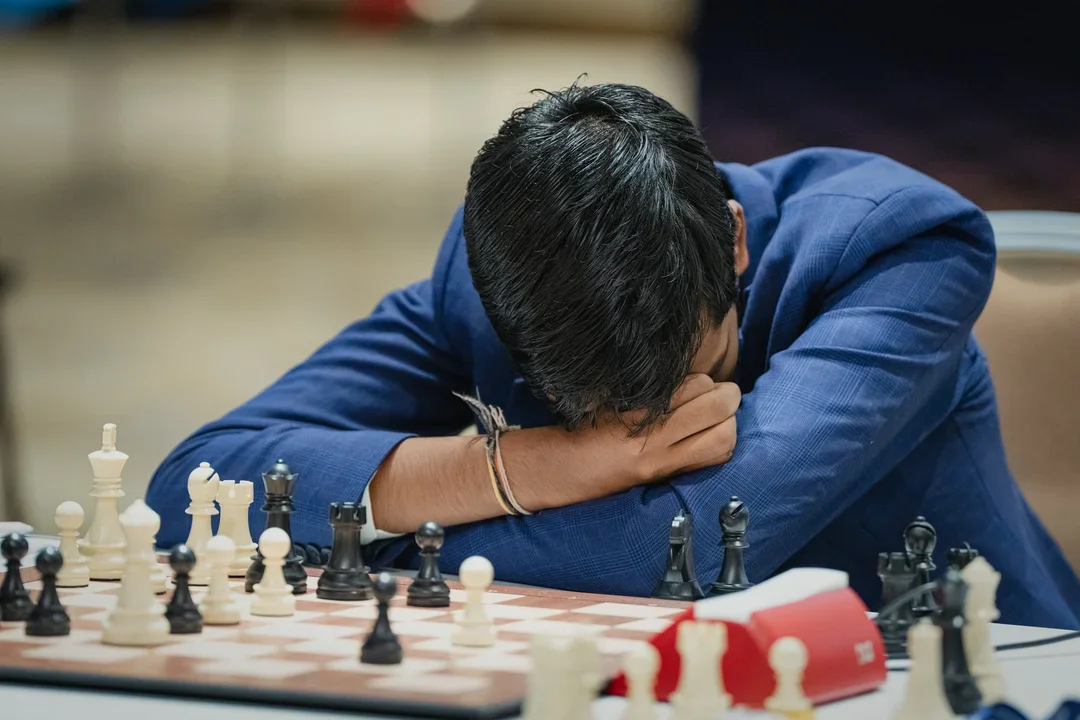
In some sense, the 18-year-and-one-week-year-old “Pragg” is less surprising, as his ascent to the tops of the chess world have been chronicled since his quest to chase the title of world’s youngest grandmaster. But in another sense, Pragg just crossed 2700 for the first time and was not even the highest rated of the four Indian quarterfinalists.
Abasov will face Carlsen and Caruana will play Pragg in the semifinals.
Carlsen 1½–½ Gukesh
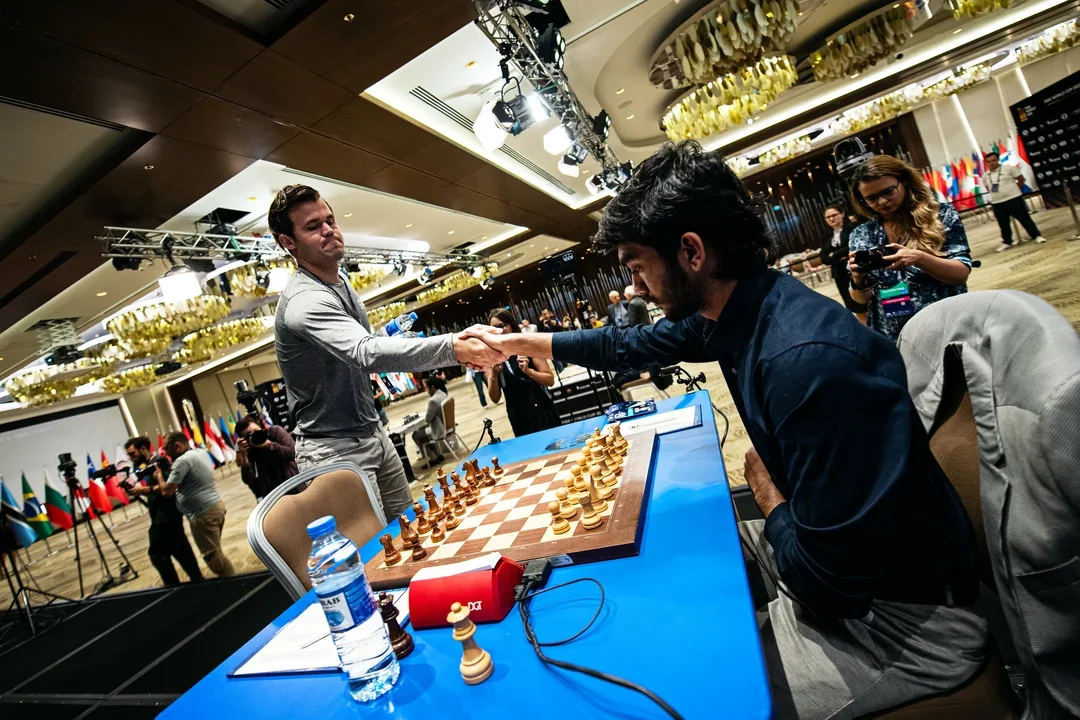
Carlsen won his first game, despite playing with the black pieces, in typical style: patiently developing a small advantage until he is presented with an opportunity to convert into a winning endgame.
He then drew the second game comfortably to advance. With three spots in the 2024 FIDE Candidates tournament up for grabs, the quarterfinal matches are of particular importance.
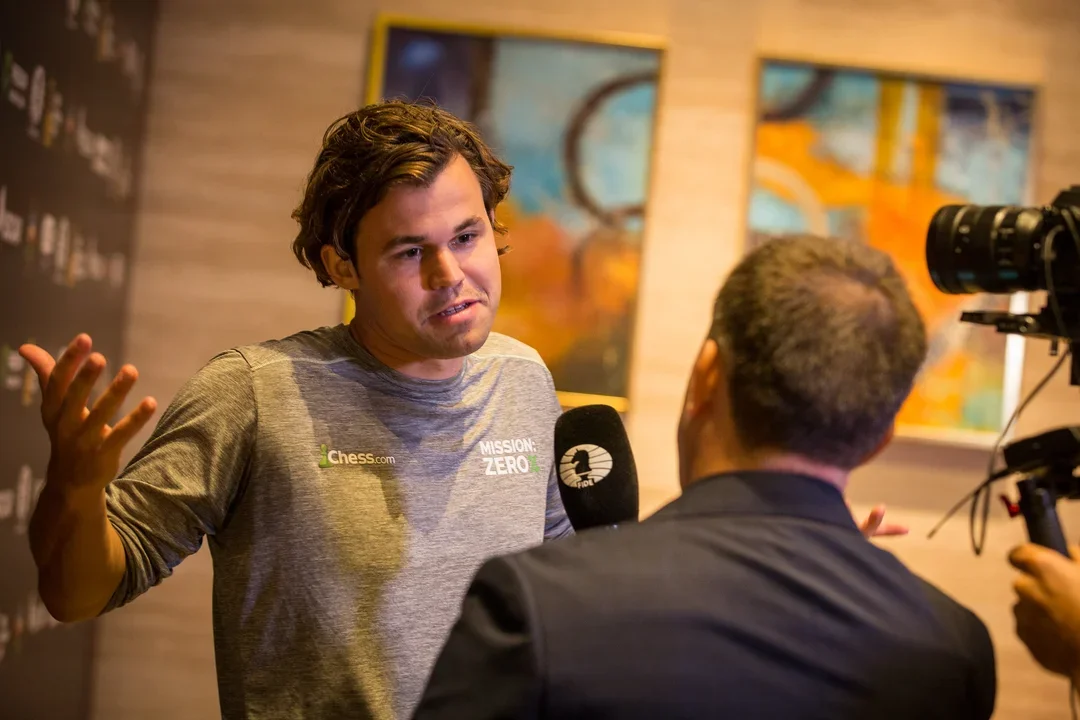
In theory, only three semifinalists are guaranteed a spot, but Magnus has said he will decline his invitation (pending changes to the current format). This means Caruana, Abasov, and Praggnanandhaa have all earned Candidates spots before the third-place match is decided.
Abasov 1½–½ Vidit
The 69th seed continued his improbable run by defeating one of the four Indian phenoms in the quarterfinals. The Azerbaijani quickly took initiative with the white pieces and never relinquished it in a compelling statement before his matchup with Carlsen.
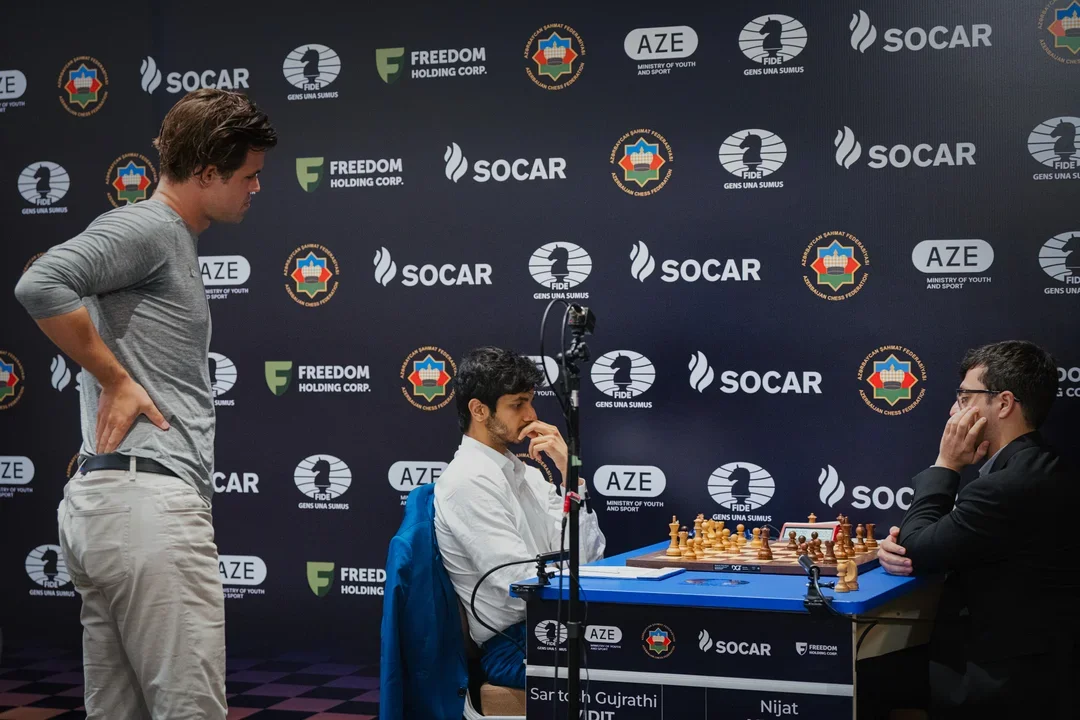
Caruana 1½–½ Dominguez
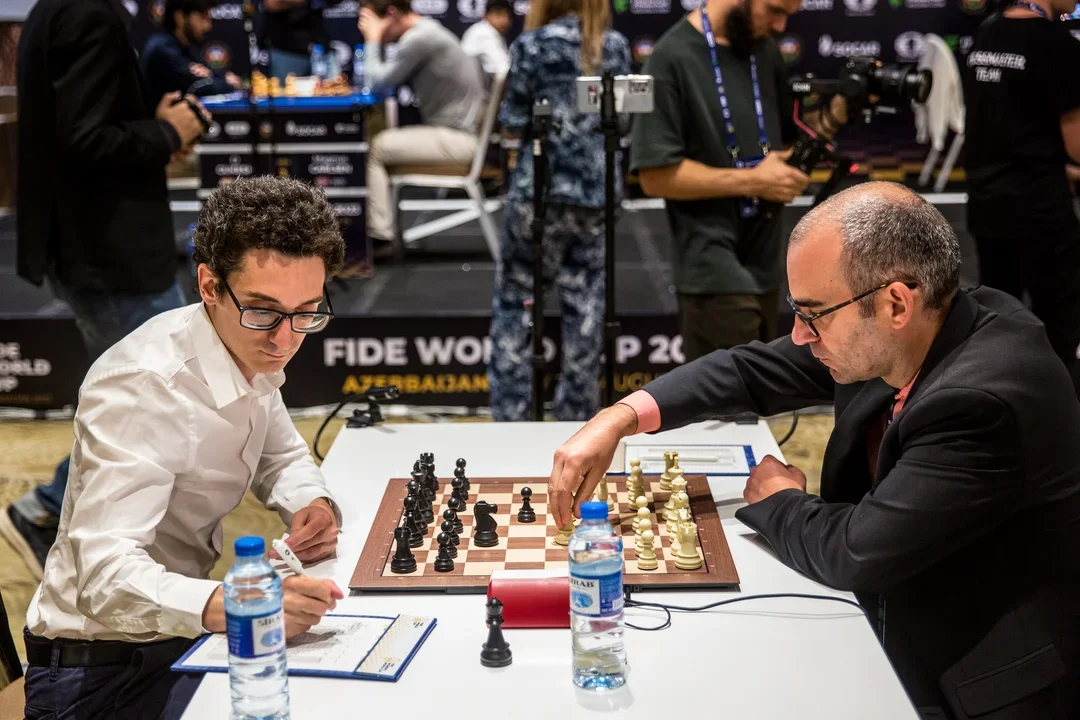
In the battle of the Americans, GM Leinier Dominguez Perez came close to converting a winning endgame in game one, but Caruana managed to create just enough complications to hold the draw. At the critical moment, Dominguez had to find the only winning move in a complicated position, and erred.
Caruana found himself in a similar position in the next game, winning a pawn before the time control after Dominguez missed a chance to create more counterplay. Dominguez then tried to play the roll of spoiler, but Caruana was able to hold on.
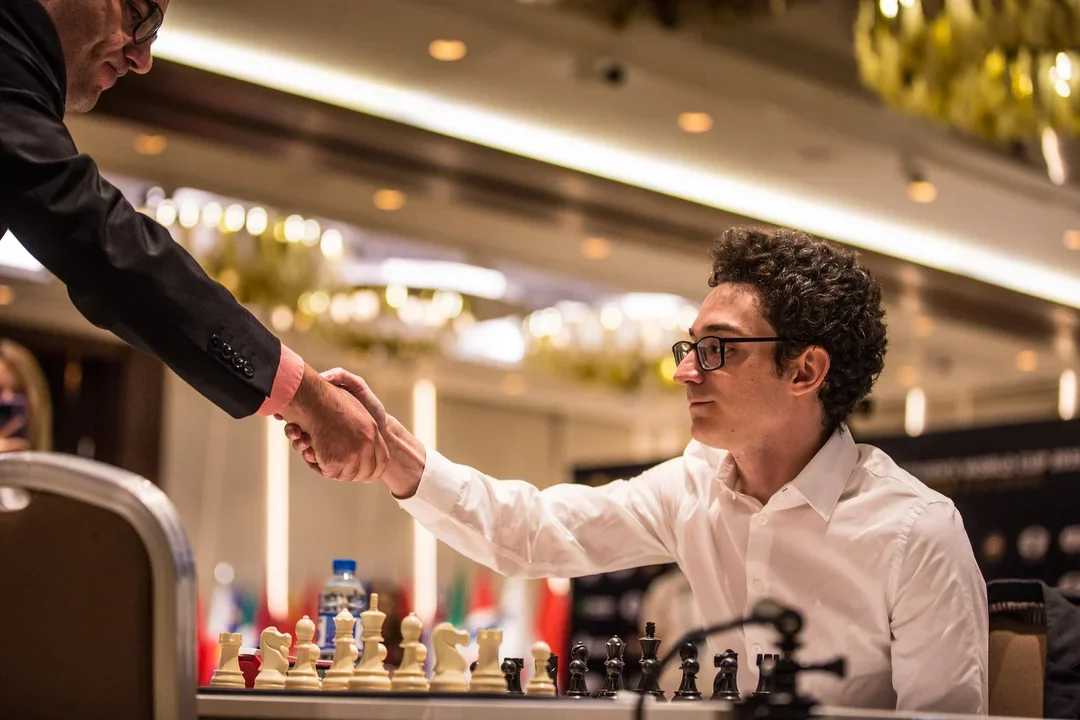
The extra rest day should prove particularly advantageous for Caruana as he prepares to face the winner of the marathon tiebreaker between Praggnanandhaa and Arjun.
Praggnanandhaa 5–4 Arjun
With no disrespect intended for the other quarterfinal matches, this was simply put the most thrilling, nail-biting, entertaining, and overall greatest attraction of the round (if not the whole tournament). 19-year-old Indian GM Arjun Erigaisi is known for producing explosive chess as well as his friendship with Pragg. Indeed, the two continued their nightly tradition of taking evening walks even during their match.
Over three days and nine games, Black boasted six victories, two draws, and only one loss. But even though White only won one game, it was the one that counted, with Praggnanandhaa winning the first “sudden death” blitz game.
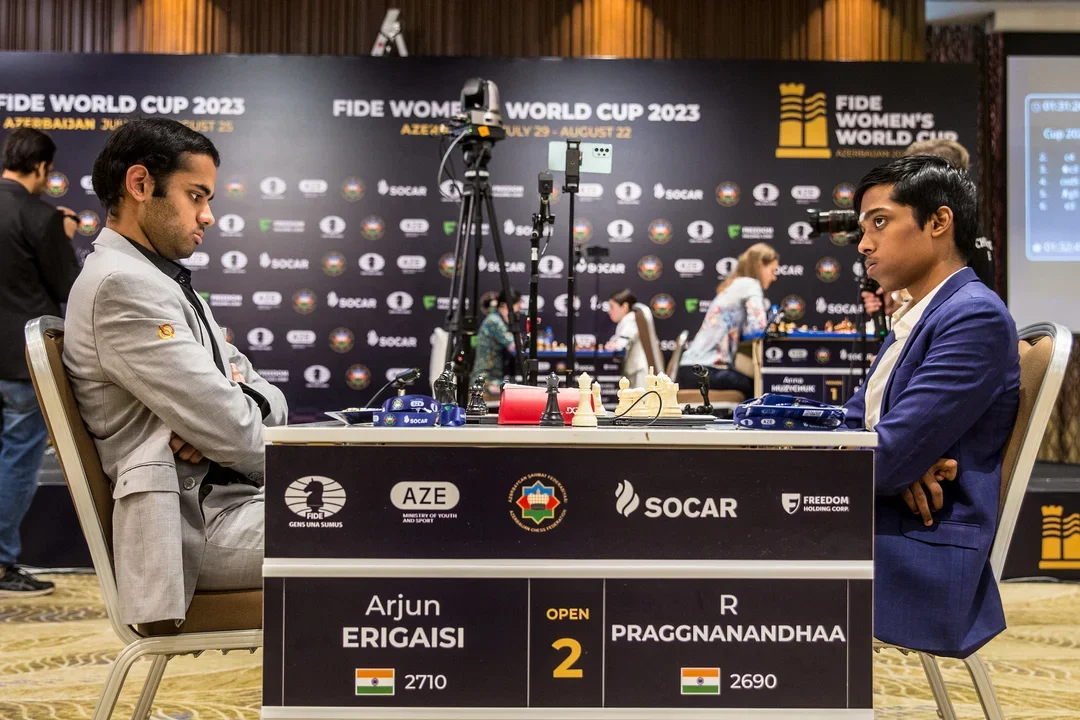
As a reminder of the tiebreaker format, the players first play a pair of rapid games (25-minute games with 10-second increment per move). If tied, they then play a pair of 10-minute games with 10-second increment. If still tied, they play a pair of 5-minute games with only 3-second increment. And, finally, if still tied, they begin playing individual 3-minute games (with only 2-second increment) until there’s a winner.
Arjun had to be a heavy favorite after winning the first classical match, particularly since he had the black pieces. Some nice ideas in the endgame, including a sound piece sac, gave him what he needed.
But “Pragg” came roaring back, allowing Arjun’s a-pawn to advance to the sixth rank when, suddenly, White’s position was in shambles and the pawn was frozen.
After two draws in the rapid tiebreaks (the only two draws of their nine games), things got intense. In the ten-minute games, Pragg first won a remarkably complex rook-and-many-passed-pawns endgame.
In his first must-win game, Arjun then played boldly on the queenside, advancing a pawn to the seventh out of the opening and forcing a quick resignation.
In the first blitz game, Pragg’s ferocious tactical finish really felt like it was an exclamation mark on the match.
But then, needing to win with the black pieces on demand once again, Arjun delivered a perfectly measured response to Pragg’s Queen’s Gambit, playing just boldly enough without exposing himself to anything too obvious in order to force sudden death.
When nothing else is working, play 1. b3 (or, here, 1. Nf3 followed by 2. b3) and stop worrying about things like “an objective advantage” in the opening. Pragg put this tilt-tested strategy to work in the final game, winning a pawn early and holding on to convert the resulting rook endgame.
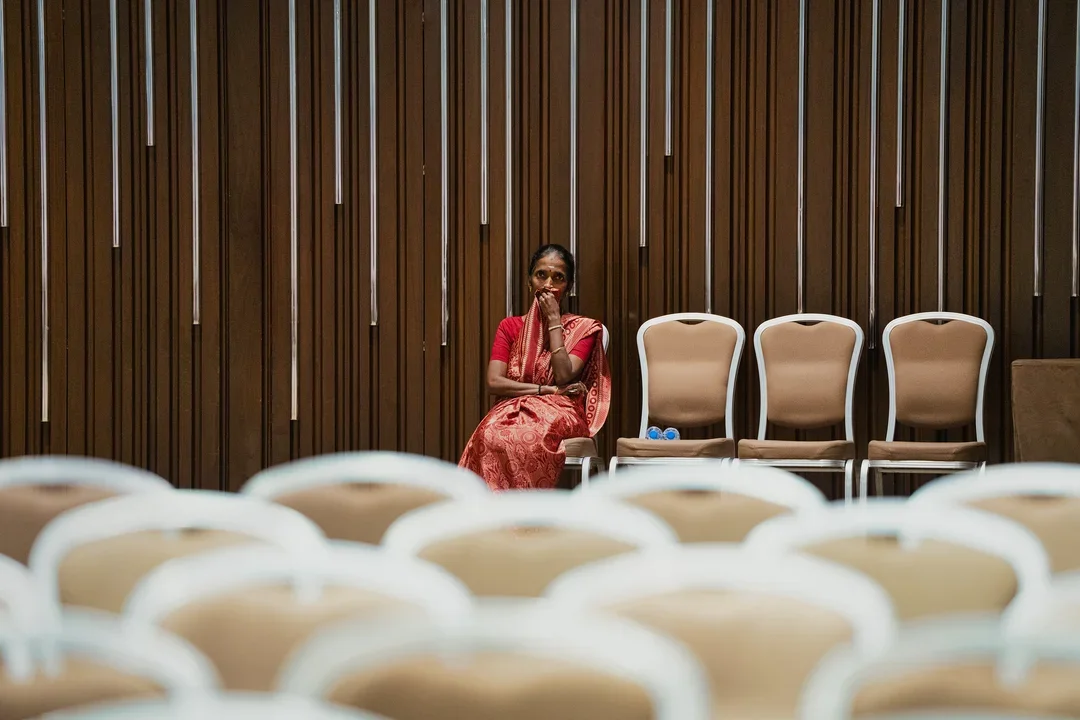
This entire match is worthy of far deeper and more detailed attention than it has received here. For now, hopefully this makes Pragg’s encounter with Caruana this weekend even more exciting.
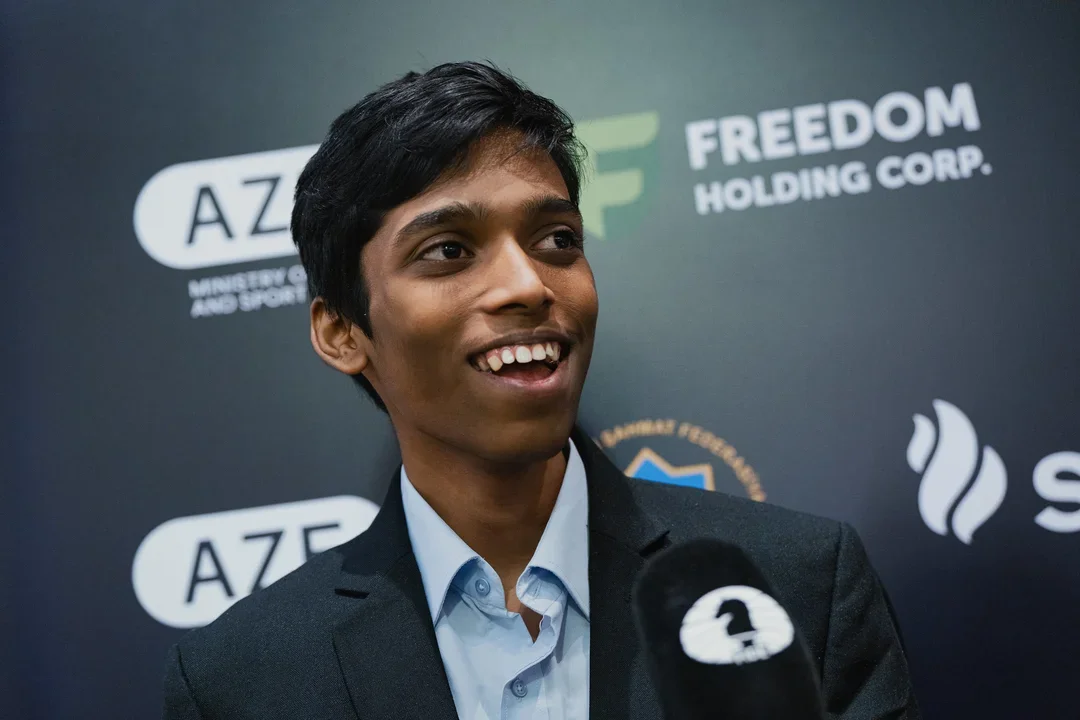
Women’s World Cup: Goryachkina versus Salimova set
Because the Women’s World Cup is one round shorter than the World Cup, the semifinals were already played this week, with the finals and match for third place to begin Saturday.
Similarly, three spots in the 2024 Women’s Candidates are up for grabs. One interesting difference, however, is that the fourth-place finisher would not qualify in the event that one of the top three finishers either declined or already received an invitation. Rather, that spot will be determined by rating.
This is relevant because semifinalist GM Alexandra Goryachkina has already qualified for the Candidates in virtue of finishing second in the FIDE 2022-23 Women’s Grand Prix.
Indeed, with Goryachkina winning her match against GM Tan Zhongyi, only two players will earn trips to the Candidates from the Women’s World Cup.
Goryachkina 1½–½ Tan
Neither of these players would be surprise entrants in the finals, to say the least, with Goryachkina having challenged GM Ju Wenjun for the 2020 Women’s World Championship and Tan having challenged GM Lei Tingjie in the Candidates finals earlier this year.
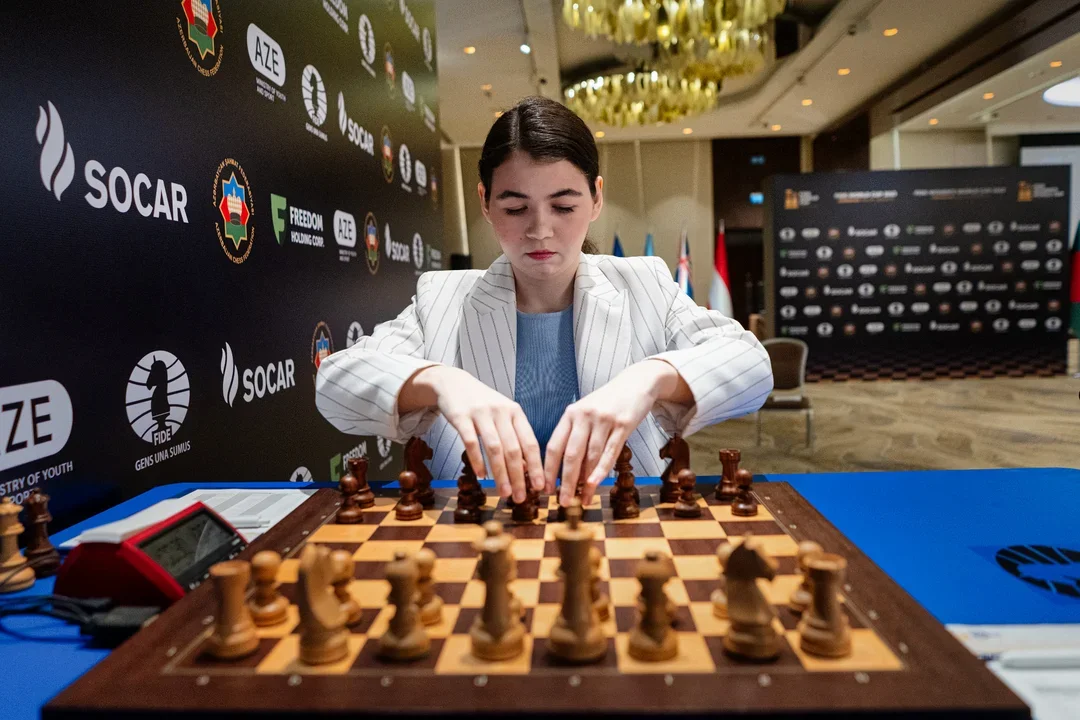
Goryachkina got the better of her opponent on the black side of a Carlsbad structure, but Tan managed to trade just enough pieces to achieve a roughly equal endgame. But almost immediately, she allowed Goryachkina a crucial pawn break that gave her an advantage she never relinquished.
Now, Tan will have to play GM Anna Muzychuk for a Candidates invitation. As a fan, this is bittersweet: both players clearly deserve to qualify, but it is nice that at least one of the third-place matches will be “high stakes” this year.
Salimova 3½–2½ A. Muzychuk
Bulgarian IM Nurgyul Salimova continued her remarkable run in this event, defeating GM Anna Muzychuk in the tiebreaks of their tense match. The result was particularly noteworthy because Muzychuk has won world championships in both rapid and blitz time controls, making her a particularly daunting tiebreak opponent.
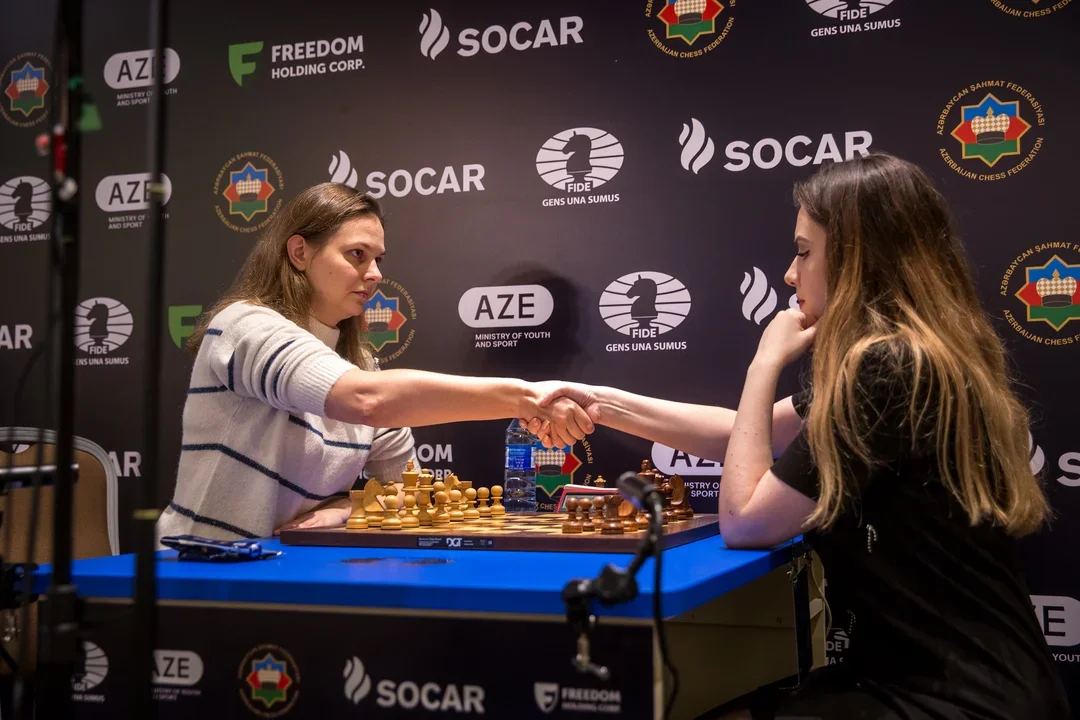
But after two draws in the classical portion, Salimova came out swinging with the black pieces. In a time scramble for the ages, she sacrificed a rook that Muzychuk really should not have taken.
Needing to win on demand, Muzychuk was up for the challenge. But in the first ten-minute game, Salimova (this time playing with the apparent disadvantage of moving first) unleashed yet another tactical storm.
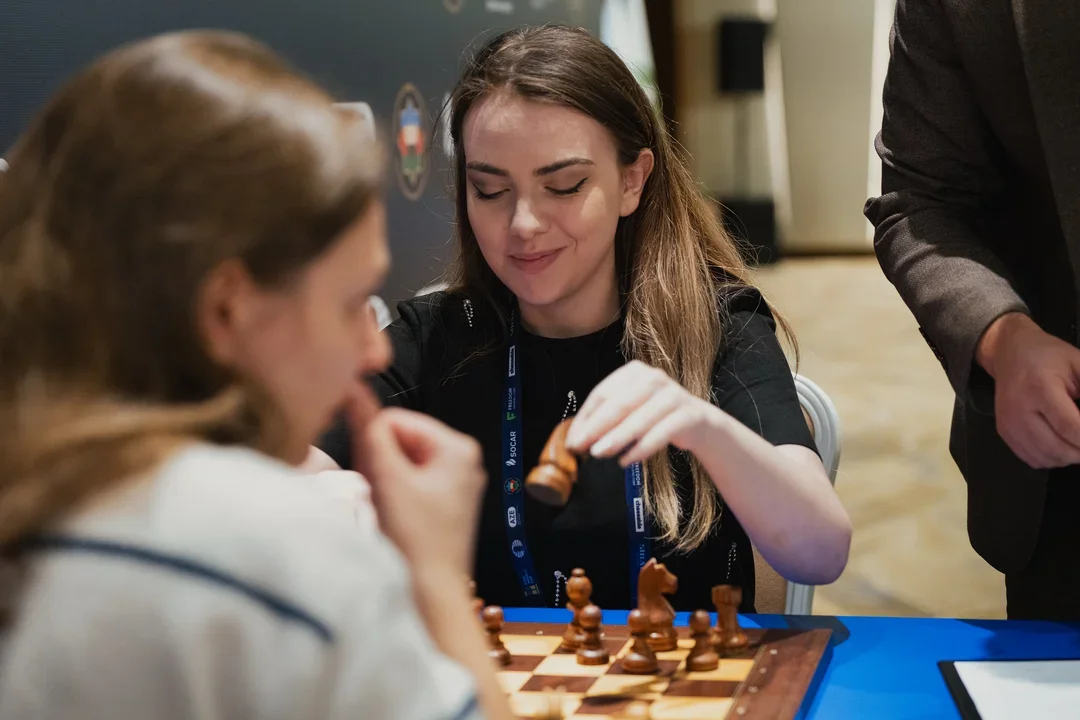
This time, Muzychuk was unable to counter, sending Salimova to the finals along with her automatic GM norm and a spot in the Candidates.
Having already earned her second GM norm and becoming the first IM in 26 years to qualify for the Women’s Candidates, one might wonder what else Salimova has to play for. As if the title of champion was not enough, she would also earn the GM title automatically in virtue of winning the Women’s World Cup. There is a ratings minimum of 2300 for this automatic conferral to go through, but Salimova is currently 120 points over the threshold.
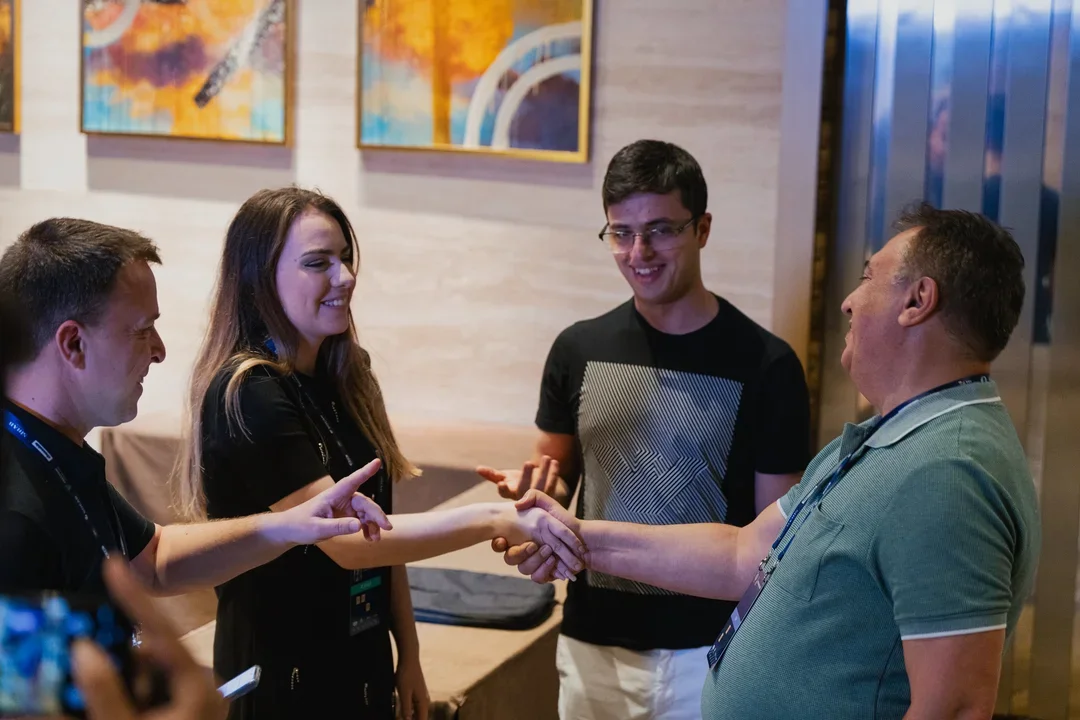
This would also make Salimova just the 11th woman to earn the GM title at the age of 20 or under, as well as the 42nd woman overall. No pressure, Nurgyul!
Categories
Archives
- January 2026 (9)
- December 2025 (27)
- November 2025 (29)
- October 2025 (39)
- September 2025 (27)
- August 2025 (29)
- July 2025 (43)
- June 2025 (25)
- May 2025 (24)
- April 2025 (29)
- March 2025 (29)
- February 2025 (20)
- January 2025 (24)
- December 2024 (34)
- November 2024 (18)
- October 2024 (35)
- September 2024 (23)
- August 2024 (27)
- July 2024 (44)
- June 2024 (27)
- May 2024 (31)
- April 2024 (51)
- March 2024 (34)
- February 2024 (25)
- January 2024 (26)
- December 2023 (29)
- November 2023 (26)
- October 2023 (37)
- September 2023 (27)
- August 2023 (37)
- July 2023 (47)
- June 2023 (33)
- May 2023 (37)
- April 2023 (45)
- March 2023 (37)
- February 2023 (28)
- January 2023 (31)
- December 2022 (23)
- November 2022 (32)
- October 2022 (31)
- September 2022 (19)
- August 2022 (39)
- July 2022 (32)
- June 2022 (35)
- May 2022 (21)
- April 2022 (31)
- March 2022 (33)
- February 2022 (21)
- January 2022 (27)
- December 2021 (36)
- November 2021 (34)
- October 2021 (25)
- September 2021 (25)
- August 2021 (41)
- July 2021 (36)
- June 2021 (29)
- May 2021 (29)
- April 2021 (31)
- March 2021 (33)
- February 2021 (28)
- January 2021 (29)
- December 2020 (38)
- November 2020 (40)
- October 2020 (41)
- September 2020 (35)
- August 2020 (38)
- July 2020 (36)
- June 2020 (46)
- May 2020 (42)
- April 2020 (37)
- March 2020 (60)
- February 2020 (38)
- January 2020 (45)
- December 2019 (34)
- November 2019 (35)
- October 2019 (42)
- September 2019 (45)
- August 2019 (56)
- July 2019 (44)
- June 2019 (35)
- May 2019 (40)
- April 2019 (48)
- March 2019 (61)
- February 2019 (39)
- January 2019 (30)
- December 2018 (29)
- November 2018 (51)
- October 2018 (45)
- September 2018 (29)
- August 2018 (49)
- July 2018 (35)
- June 2018 (31)
- May 2018 (39)
- April 2018 (31)
- March 2018 (26)
- February 2018 (33)
- January 2018 (30)
- December 2017 (26)
- November 2017 (24)
- October 2017 (30)
- September 2017 (30)
- August 2017 (31)
- July 2017 (28)
- June 2017 (32)
- May 2017 (26)
- April 2017 (37)
- March 2017 (28)
- February 2017 (30)
- January 2017 (27)
- December 2016 (29)
- November 2016 (24)
- October 2016 (32)
- September 2016 (31)
- August 2016 (27)
- July 2016 (24)
- June 2016 (26)
- May 2016 (19)
- April 2016 (30)
- March 2016 (36)
- February 2016 (28)
- January 2016 (32)
- December 2015 (26)
- November 2015 (23)
- October 2015 (16)
- September 2015 (28)
- August 2015 (28)
- July 2015 (6)
- June 2015 (1)
- May 2015 (2)
- April 2015 (1)
- February 2015 (3)
- January 2015 (1)
- December 2014 (1)
- July 2010 (1)
- October 1991 (1)
- August 1989 (1)
- January 1988 (1)
- December 1983 (1)







